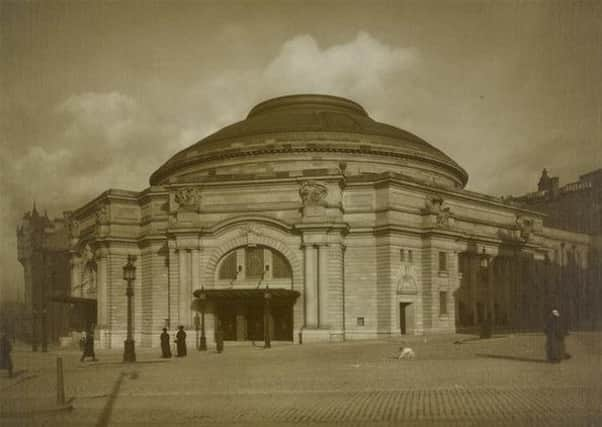Lost Edinburgh: 100 years of the Usher Hall


19 July 1911 signalled the beginning of the Usher Hall’s construction, as one thousand spectators packed into a temporary amphitheatre to witness King George V and Queen Mary lay two memorial stones. One notable absentee from the proceedings was Mr Andrew Usher – the hall’s major benefactor – who had died several years earlier.
Donation for a new town hall
Similar to the equally ostentatious McEwan Hall, the Usher Hall was mostly made possible due to the extraordinary generosity of a well-known local brewer. In 1896 Mr Andrew Usher gifted a sum worth around £10m in today’s money to the city of Edinburgh with the attached proviso that it would be used to build a three thousand-seater, multi-purpose town hall which “everyone could enjoy”. At the age of 70 Mr Usher would have been well aware that his chances of ever witnessing his ambitious proposal bear fruit were slim, and so it proved just two years later in 1898 as he passed away before the city had determined either the hall’s location or design.
Lothian Road or the Meadows?
Advertisement
Hide AdThe difficult search for a location to place the Usher Hall is widely regarded as the main factor behind its lengthy delay. Incredibly, in July 1898, the Bartholomew company printed 100 copies of a prospective map which designated space for the new Usher Hall at the western edge of the Meadows. This was never likely to be given the go-ahead as an act of Parliament prevented the building of any large permanent structures within the park. Other proposed sites included Port Hopetoun canal basin between Lothian Road and Semple Street, the High Street adjacent the City Chambers, and the west end of Chambers Street where now stands the National Museum of Scotland.
Sufficient space for the Usher Hall was eventually found in 1910 when the Board School on Lothian Road shut its doors. The substantial school building was quickly demolished and Edinburgh’s new city hall could finally become a reality. Initial designs for a great rectangular hall were scrapped in favour of the grand circular auditorium which stands today. The total cost was £134,000 – including £4k for the organ.
Opening year
The Usher Hall hosted its first concert on March 6 1914. Ten days later it was officially opened in extravagant style with a concert featuring music by Handel, Wagner, Bach, Beethoven and the Scottish composer Hamish MacCunn.
Due to the Temperance movement which was popular at the time, a ban on alcohol was in force at the Usher Hall for the first few years - a rather ironic situation considering the proceeds from the mass-consumption of alcohol had practically paid for the venue’s construction.
Later in 1914 the new Usher Hall welcomed local politician Sir George McCrae as he made an impassioned speech that led to the creation of his famous WWI ‘footballers battalion’. Colonel Sir George McCrae is now regarded as a war hero and moves to rename part of Cambridge Street to ‘McCrae Place’ are currently underway.
A prestigious reputation
Over the years the Usher Hall has cemented its place as one of Scotland’s most prestigious musical venues and has been frequently praised for its exceptional acoustics. In 1947 it became the flagship concert venue for the city’s first ever International Festival and has since played host to a glittering array of world famous composers, entertainers and pop stars from the Rolling Stones, Chuck Berry and Pink Floyd to Ella Fitzgerald, Burt Bacharach and Johnny Cash. The 1972 Eurovision Song Contest and boxing matches for the 1986 Commonwealth Game have also been hosted at the Usher Hall.
Centenary celebrations
Advertisement
Hide AdFollowing a major £25m refurbishment programme (interestingly, this figure is considerably higher than the building’s original price tag – even adjusted for inflation) the Usher Hall is in great shape for its upcoming 100th birthday celebrations.
A number of events are planned for the 100 years bash beginning this week, including the Usher Hall Centenary Concert featuring the Royal Scottish National Opera and the Edinburgh Royal Choral Union who will be performing a replica of the venue’s first ever official orchestral concert in 1914, and the Gilded Comedy Gala on 7 March boasting top comedians Dylan Moran, Phil Jupitus and Gary: Tank Commander.
• Visit Lost Edinburgh on their Facebook page, and follow them on Twitter @lostedinburgh